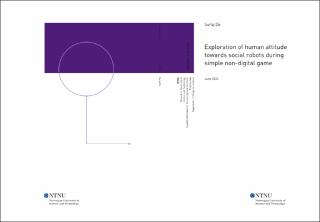| dc.contributor.advisor | Mishra, Deepti | |
| dc.contributor.advisor | Inal, Yavuz | |
| dc.contributor.author | De, Suraj | |
| dc.date.accessioned | 2022-07-07T17:21:08Z | |
| dc.date.available | 2022-07-07T17:21:08Z | |
| dc.date.issued | 2022 | |
| dc.identifier | no.ntnu:inspera:106263327:71393180 | |
| dc.identifier.uri | https://hdl.handle.net/11250/3003647 | |
| dc.description.abstract | Introduksjonen av roboter i moderne sivilisasjon har endret måten maskiner fungerer på. De er ikke lenger i et herre-slave forhold til mennesket. Med introduksjonen av sosial robotikk kan disse kunstige vesenene nå stå på lik linje med mennesker. Roboter har avansert på en rekke forskjellige områder, inkludert medisin, industri og spill. Derfor er det viktig at vi skaper et stabilt miljø hvor både mennesker og roboter kan trives. Mennesker, på den annen side, har begynt å avsky roboter når de tar sin plass i dette menneskelige samfunnet. Arbeidsledighet som følge av at roboter tar jobber forsterker de negative effektene. For å utvikle et sunt økosystem er det derfor viktig å forstå hvordan mennesker har det med roboter nå og i fremtiden. Fra et spillperspektiv forsøker denne studien å undersøke denne mentaliteten ved å stille spørsmål ved de unike komponentene i samarbeid og konkurranseegenskaper. Enkeltpersoners emosjonelle data samles inn i løpet av spillet og trender analyseres for å utvikle en kobling mellom konkurranse- og samarbeidssituasjoner. Forestillingen om at samarbeids- og konkurransesituasjoner eksisterer parallelt, støttes av betydelige og pålitelige resultater fra eksperimentell brukerforskning. Ideen om at samarbeidende og konkurransedyktige former for spill eksisterer side om side, støttes av betydelige og pålitelige resultater fra eksperimentell brukerforskning. En dypere studie av dette temaet i fremtiden vil føre til en større forståelse av menneskelige holdninger til roboter, noe som vil hjelpe oss å oppnå stabilitet over hele verden. | |
| dc.description.abstract | The introduction of robots into modern civilization has changed the way machines function. With humans, they are no longer in a master-slave relationship. With the introduction of social robotics, these artificial creatures are now capable of standing on an equal footing with humans. Robots have advanced in a variety of fields, including medicine, industry, gaming, and others. As a result, it is critical that we build a stable environment in which both people and robots may thrive. People, on the other hand, have begun to detest robots as they take their position in this human community. Unemployment as a consequence of robots taking jobs exacerbates the negative effects. As a result, in order to develop a healthy ecosystem, it's critical to understand how people feel about robots now and in the future. From a game perspective, this study attempts to investigate this mentality by questioning the unique components of cooperative and competitive characteristics. Individuals' emotional data is collected throughout games, and trends are analyzed to develop a link between competitive and cooperative modes. The notion of cooperative and competitive modes coexisting is supported by significant and confident results obtained from experimental user research. The notion of cooperative and competitive modes coexisting is supported by significant and confident results obtained from experimental user research. Deeper investigation of this subject in the future will lead to a greater understanding of human attitudes toward robots, assisting us in achieving world-wide stability. | |
| dc.language | eng | |
| dc.publisher | NTNU | |
| dc.title | Exploration of human attitude towards social robots during simple non-digital game | |
| dc.type | Master thesis | |
